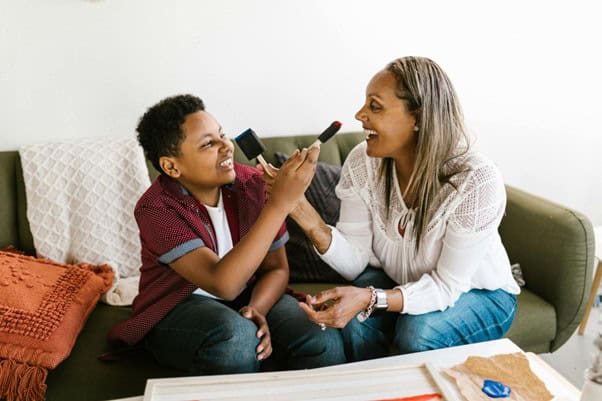
What are the benefits of family counselling, and how does it work?
Everyone’s family has its own story that shapes who we are. How we handle life’s ups and downs is often tied to how we grew up, and it’s interesting to see how our backgrounds guide our reactions and help us find our way in the world. While we all want strong and healthy relationships with our families, it can be super complicated. It’s no wonder many of us find navigating these connections challenging, whether dealing with old conflicts, feeling stuck under expectations, or just trying to communicate better. Family dynamics can be messy, but they’re also part of what makes our lives rich and full. Seeking Family Counselling can be beneficial not only to navigate through the messy dynamics but also to identify the hidden strengths each family has.
What is Family Counselling?
Family counselling is a therapeutic practice that involves working with families to improve communication, resolve conflicts, and strengthen relationships. It provides a safe environment where family members can openly express their thoughts and feelings, address unresolved issues, and work collaboratively towards positive change. Family counselling aims to enhance understanding and support within the family unit, helping foster healthier dynamics and emotional well-being among its members.

Photo by RDNE Stock project
How should you seek Family Counselling?
Family counselling can benefit individuals and families experiencing different challenges. Here are some reasons why people seek my help.
Families in Conflict: This is one of the most common reasons I get approached. It is common for family members to experience discord, as each has a different communication style. However, when these communication styles cause misunderstandings, the family dynamics can create a lot of distress. If family members struggle to express their feelings or listen to one another, counselling can provide tools and strategies to enhance communication skills. When family members are frequently arguing, experiencing misunderstandings, or unable to communicate effectively, counselling can help facilitate discussions and promote resolution.
Life Transitions: There is this expectation that family members are somehow inherently equipped to navigate significant life changes, such as divorce, relocation, or the birth of a child, with minimum support. However, life transitions can put a strain on family dynamics. Seeking support during these transitions can help families adapt and cope with the changes together. Blended families may face unique challenges when they blend different family backgrounds and dynamics. Family counselling can aid in navigating these complexities and building strong relationships among all members.
Loss or Grief: At some point in life, all families go through some loss or grief. However, seeking counselling for it often happens as overlooked due to the societal expectation that handling grief is part of life. It is not uncommon for families to get into conflict due to their inability to handle grief. Families that have experienced the loss of a loved one may benefit from counselling to address their grief collectively, helping them to support one another through the healing process.
Parenting Challenges: Parents facing difficulties in their parenting approach, whether dealing with behavioural issues or differing parenting styles, can seek guidance to enhance their partnership and improve their children’s well-being. Families from diverse backgrounds may encounter cultural or generational differences that lead to misunderstandings.
Counselling can aid in bridging these gaps and fostering mutual respect and understanding.
Emotional or Behavioral Issues or Caring Responsibilities: Families dealing with a member who has mental health challenges or behavioural issues can seek help to not only support that individual but also to strengthen the overall family unit and improve understanding. Families dealing with the caring responsibilities of family members with sudden onset of life-threatening illness or who share caring responsibilities for members with chronic diseases benefit hugely from family counselling as it allows them to reframe the changing dynamics with the family.
Ultimately, anyone looking to improve their family relationships, enhance communication, or navigate complex issues can benefit from family counselling. It’s a proactive step toward fostering harmony and support within the family unit.
How does it work?
For families seeking family counselling, it can be helpful to understand the stages of family counselling.
Initial Engagement and Understanding Good Fit: Unlike individual counselling, where the decision-making to take up therapy lies with the individual, understanding if the therapist is a good fit for all the family members is tricky. The philosophy behind family therapy is that the family is an interconnected system with its patterns and communication styles, and the beliefs of each family member both within and intergenerationally affect this system. A good way to gauge suitability when selecting a therapist is to gauge if the therapist aligns with your overall familial values rather than focusing on individual preferences. The person who appeals to one family member may not appeal to another.
Assessment and Goal Setting: Assessment and goal setting are vital steps in family counselling, as they lay the foundation for effective intervention. During the assessment phase, the therapist gathers insights into the family’s dynamics, communication patterns, and specific issues. This holistic understanding helps identify underlying problems and strengths within the family unit. Once assessed, collaboratively setting clear and achievable goals creates a focused roadmap for the therapy process. These goals provide direction, motivate family members to engage actively in the sessions, and serve as benchmarks to evaluate progress. During this stage, the therapist devises a plan for the combination of family members to be worked with within the session. It is common for therapists to suggest various combinations of family members (e.g. mother and son) or (mother and father) to attend separate sessions to work with individual members. Ultimately, this step fosters a sense of purpose and shared commitment to improving relationships and enhancing emotional well-being.
Therapeutic approaches and working methods: Family therapists typically operate under the foundational belief that families function as interconnected systems, where each member influences and is influenced by others. This perspective emphasizes the dynamics of relationships within the family unit. Depending on their training and expertise in various therapeutic methodologies, therapists may incorporate diverse techniques and strategies during their sessions. For instance, some might utilize structural family therapy to address patterns of interaction, while others could apply cognitive-behavioural methods to help family members modify negative thought patterns. Narrative and creative therapists often use creative interventions and artmaking to contextualize the family dynamics and reframe some beliefs that negatively affect the family. By tailoring their approaches to teach the family’s unique needs, therapists aim to facilitate deeper understanding, improved communication, and healthier relational dynamics among family members.
Closure and Ongoing Support: The crucial step in the essential stages involves preparing the family for closure providing them with the necessary tools and strategies to foster enduring changes in their relationships. As Family Therapy is typically time-bound, reaching this stage is often done collaboratively in consultation with the family to ensure they feel supported and empowered throughout the transition.
Benefits of Family Counselling:
Family counselling offers several benefits that can enhance relationships and overall family well-being. It aids in improving communication skills, allowing family members to express their thoughts and feelings more effectively. Participants also learn coping mechanisms that help them self-regulate their emotions, leading to healthier interactions. Additionally, counselling can assist in reframing family dynamics and fostering a more supportive and understanding environment among family members.
Family counselling is undoubtedly beneficial to sorting out conflicts and helping manage challenging emotions. Still, it also comes with a fantastic bonus: the chance to discover the wisdom and hidden strengths passed down through generations. When families come together in this supportive space, they can explore stories and lessons from their past that can enrich their relationships today. It’s an excellent opportunity to learn about how experiences from previous generations have shaped who they are now, often revealing strengths and resilience that family members might not even realize they have.
In a nutshell, family counselling helps bridge the gap between the past and the present. It empowers families to tap into their rich history to create a more loving and supportive environment for everyone.
At Mindkshetra, Rupa is all about offering family therapy services that play a vital role in how we support young people. Our culturally sensitive sessions aim to create a warm atmosphere where families can talk openly, strengthen their connections, and tackle the ups and downs of raising teens. By including everyone in the family in the therapy process, we work together to build a positive environment that encourages emotional well-being and personal growth for all. Learn more about Mindkshetra

Written by:
Rupa is a cultural artist, Art Psychotherapist/ Counsellor, Podcaster and founder of Mindkshetra (a social enterprise) with extensive experience working with young people and their families.
More Articles:
